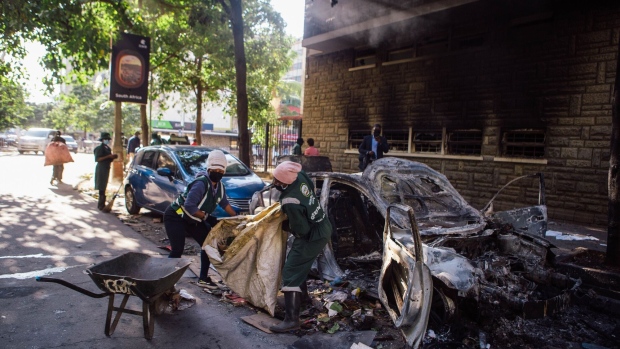Jun 27, 2024
Ruto Concedes to Protests, Now He Must Fix Kenya’s Budget
, Bloomberg News

(Bloomberg) -- Kenyan President William Ruto on Wednesday evening conceded to mass street protests and withdrew a contentious finance bill that included a raft of tax hikes.
Now he needs to figure out how to right the fiscal ship of East Africa’s most industrialized economy, and restore trust with citizens even as the country reels from a brutal police crackdown that left at least 23 people dead this week.
Having “listened keenly to the people of Kenya that have said loudly that they want nothing to do with the finance bill of 2024, I concede and will not sign the 2024 finance bill,” Ruto said.
Ruto struck a conciliatory tone in his address announcing the withdrawal of the bill, and pledged a series of austerity measures — including cutting spending in the executive, parliament and judiciary — and to tackle corruption that’s rife in the country. But the bill had sought to raise 302 billion shillings ($2.3 billion) in additional revenue for an economy that the International Monetary Fund deems in danger of debt distress, and it’s unclear how he can fill that hole without more borrowing.
“Ruto’s challenge is how else does he achieve the fiscal targets he’s committed to under the IMF program,” said Yvonne Mhango, Africa economist at Bloomberg Economics, referring to a $3.6 billion bailout the country got from the Washington-based lender in 2021. “He has little wiggle room with spending cuts, and the item that is likely to be slashed is capex, which is negative for growth. He can increase borrowing but that’s at a high cost — domestically liquidity is his constraint, as we saw last year.”
Yields on the 2031 eurobonds fell 2 basis points to 10.65% as at 5:07 p.m. in London. The shilling fell 0.3% against the dollar to trade at 128.95.
Ruto had “seriously misjudged the amount of anger among the population over the tax hikes and the underlying socioeconomic conditions that have driven the high levels of frustration towards them,” said Andrew Smith, senior Africa Analyst at Verisk Maplecroft.
Still, Wednesday’s speech was a marked shift for Ruto, who took to the airwaves on Tuesday evening — after a day that saw police fire live rounds on largely peaceful protesters and the storming of part of the National Assembly — to denounce demonstrators as treasonous. Since taking office in 2022, he has pushed through a series of unpopular tax hikes — on everything from bread to wheelchairs — aimed at addressing the country’s debt burden and unlock further IMF funding.
Those moves have been greeted by investors, helping make the shilling the world’s best performing currency so far this year. It also issued about $1.4 billion eurobonds in February to partly refinance a debt, which matured Monday, after years of being priced out of the capital markets due to high borrowing rates.
But it has squeezed the average Kenyan, and young people in particular, in a country where as many two-thirds of the youth — who make up the majority of the population — are unemployed, according to the Kenyan Federation of Employees.
Ruto pointed to a number of programs his administration has enacted that employ hundreds of thousands of young Kenyans, including a house-building initiative. But he also said many of the plans he has to boost growth and job creation will have to be cut to compensate for the revenues lost to the withdrawal of the finance bill.
Sign up here for the twice-weekly Next Africa newsletter
“We have made significant progress in pulling the nation back from the brink of debt distress,” he said on Wednesday. “Our debt situation is better managed, and our budget now has space for investment in programs aimed at easing the hardship on vulnerable people and creating opportunities for the youth.”
Kenya is also pursuing labor export deals with other nations as part of a plan to get jobs for young people, Ruto said.
Like many developing countries, Kenya faces an urgent need to enact fiscal reforms, including to meet IMF conditions that require boosting tax revenues, reducing borrowing and cut spending. But with his concession to popular opinion, Ruto’s options are narrowing even as he looks to rein in a budget deficit running at 3.3% and an interest burden that takes away a third of government revenue.
Debt will undoubtedly be the first option in the event government faces a budget gap, according to Stellar Swakei, a senior associate for research at Standard Investment Bank.
“Ruto faces a major economic challenge going forward. His presidency is premised on hard adjustments in return for economic prosperity, but many Kenyans are dissatisfied with the latter and election campaigns are just a year away,” said Connor Vasey, a managing consultant on Africa at London-based consultancy J.S. Held. “He has bitten the bullet up until now on some difficult policy adjustments, but the dividends might be coming too late.”
You can follow Bloomberg’s reporting on Africa on WhatsApp. Sign up here.
--With assistance from Simon Marks.
©2024 Bloomberg L.P.






